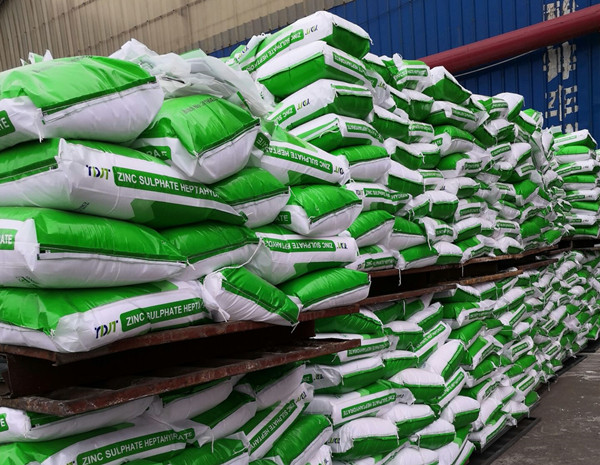Jun. 17, 2023
Agriculture
Zinc sulphate heptahydrate is a compound that contains zinc, sulphur, and water molecules. It is commonly used in various industries due to its diverse applications and beneficial properties. This article explores the uses, benefits, sources, and safety considerations associated with zinc sulphate heptahydrate, highlighting its significance in different fields.
Zinc sulphate heptahydrate, with the chemical formula ZnSO4·7H2O, is a crystalline compound. It is derived from zinc, a vital mineral for human health, and sulphuric acid. The presence of seven water molecules makes it a hydrated form of zinc sulphate.
2.1 Agricultural Applications Zinc sulphate heptahydrate is widely used in agriculture as a fertilizer and soil amendment. It provides an essential source of zinc, a micronutrient necessary for plant growth and development. Zinc deficiency in soil can be remedied by applying zinc sulphate heptahydrate, promoting healthier crop yields.
2.2 Animal Nutrition In animal nutrition, zinc sulphate heptahydrate is added to animal feed as a dietary supplement. Zinc plays a crucial role in various physiological functions, including growth, reproduction, and immune system support. Supplementing animal feed with zinc sulphate heptahydrate helps ensure optimal health and productivity in livestock.
2.3 Industrial Uses Zinc sulphate heptahydrate finds application in various industrial processes. It is used in the production of dyes, pigments, and preservatives. Additionally, it serves as a coagulant in the manufacturing of rayon, a synthetic fiber, and as a component in the production of zinc-based chemicals.

3.1 Plant Growth and Crop Yield Zinc sulphate heptahydrate provides an easily absorbable form of zinc for plants, promoting healthy growth and higher crop yields. Zinc is essential for enzyme function, chlorophyll synthesis, and overall plant development.
3.2 Animal Health and Productivity Zinc is a crucial micronutrient for animals, supporting immune function, metabolism, and reproductive health. Supplementing animal feed with zinc sulphate heptahydrate helps prevent zinc deficiency and improves overall animal well-being and productivity.
3.3 Industrial Applications In the industrial sector, zinc sulphate heptahydrate serves as a valuable component in various manufacturing processes, including the production of dyes, pigments, and rayon. Its properties contribute to the quality and effectiveness of these products.
Zinc sulphate heptahydrate can be obtained from the following sources:
4.1 Chemical Synthesis The compound is synthesized through the reaction of zinc oxide or zinc metal with sulphuric acid. This process yields the crystalline form of zinc sulphate heptahydrate.
4.2 Natural Deposits Zinc sulphate heptahydrate can also be found in natural deposits, primarily in areas with high zinc mineralization. These deposits are mined and processed to extract and refine zinc sulphate heptahydrate for commercial use.
5. Safety Considerations
5.1 Handling and Storage Zinc sulphate heptahydrate should be handled with care, following proper safety precautions. It should be stored in a cool, dry place away from incompatible materials and sources of ignition.
5.2 Environmental Impact When used as directed, zinc sulphate heptahydrate is considered safe for the environment. However, excessive or improper use can lead to environmental contamination. It is essential to follow recommended application rates and disposal guidelines to minimize any potential negative impact.
5.3 Health Considerations While zinc sulphate heptahydrate is generally safe to handle, direct contact with the compound should be avoided to prevent skin and eye irritation. In case of accidental ingestion or prolonged exposure, seeking medical advice is recommended.
Zinc sulphate heptahydrate plays a crucial role in agriculture, animal nutrition, and various industrial applications. Its benefits include promoting plant growth, improving animal health and productivity, and contributing to the manufacturing of diverse products. When used responsibly and following safety considerations, zinc sulphate heptahydrate serves as a valuable resource in multiple fields, supporting growth, productivity, and sustainability.
Q1. Is zinc sulphate heptahydrate safe for organic farming? A1. Yes, zinc sulphate heptahydrate can be used in organic farming as a zinc supplement to address deficiencies. However, it is essential to check with organic certification bodies to ensure compliance with specific regulations.
Q2. Can zinc sulphate heptahydrate be used in hydroponic systems? A2. Yes, zinc sulphate heptahydrate can be used in hydroponic systems as a source of zinc for plants. However, proper dilution and application methods should be followed to prevent over-fertilization.
Q3. Are there any alternatives to zinc sulphate heptahydrate for animal nutrition? A3. Other zinc compounds, such as zinc oxide or zinc chelates, can be used as alternatives for animal nutrition. The choice depends on specific requirements and considerations.
Q4. Can zinc sulphate heptahydrate be used in human supplements? A4. Zinc sulphate heptahydrate is primarily used in animal and plant nutrition. For human supplementation, other forms of zinc, such as zinc gluconate or zinc citrate, are more commonly utilized.
Q5. What is the shelf life of zinc sulphate heptahydrate? A5. When stored properly, zinc sulphate heptahydrate has a long shelf life. However, it is recommended to use the product within its specified expiration date to ensure optimal quality and efficacy.
More:https://www.dynamicbiotech.com/
Previous: Planting Flat Trays: The Foundation for Successful Gardening
Next: Building a Shipping Container Greenhouse: A Comprehensive Guide
If you are interested in sending in a Guest Blogger Submission,welcome to write for us!
All Comments ( 0 )